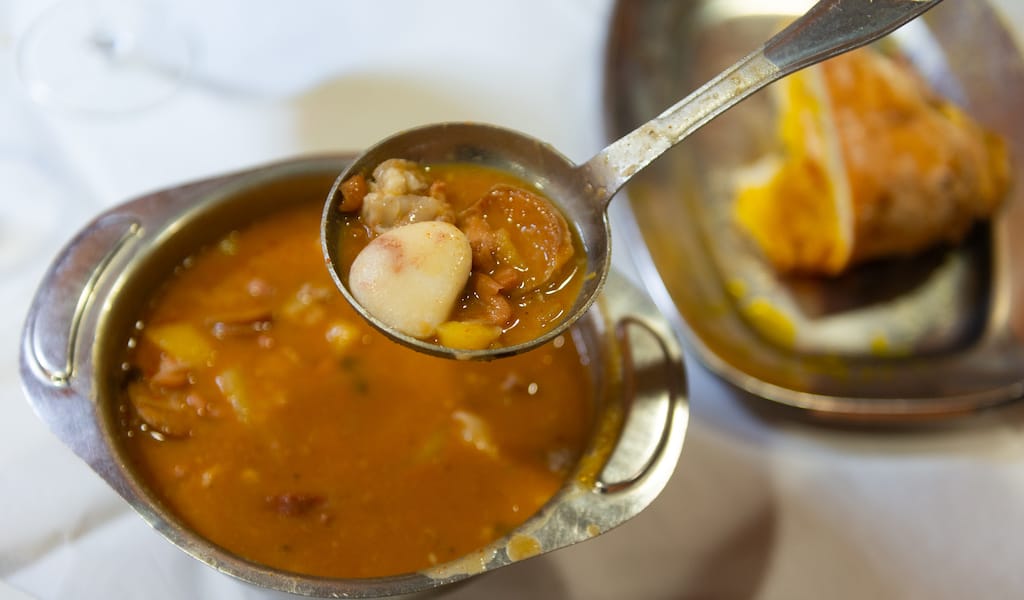Update: This spot is sadly no longer open.
The late Christos Kaskavelis began his career as a traveling salesman of sorts: he owned a portable canteen, a common sight at farmers’ markets around Athens. Moving daily from one market to the next, he prepared coffee and snacks for the market vendors, delivering their orders on his traditional metal tray.
Yet Christos harbored a special passion for koutoukia, or basement tavernas, those hidden, underground, low-budget eateries that offer a laidback atmosphere and are packed come wintertime. Places where the chatter of patrons combines with the Greek music playing in the background to create a pleasing din. For Christos, this was the best type of taverna, and it was his dream to one day open his own.
In 1968, his dream came true. He found his ideal little basement on the corner of Aristidou and Dimitrakopoulou in Kallithea and decided to finally take the plunge. His wife, Panayiota, a dynamic woman and an exceptional cook, became his business partner, taking up her post in the kitchen. The place was uncharacteristically named Ramona – not the usual Maria or Kostas – after the 1928 song of the same name.

A few years later, in 1974, the couple moved their business to a larger basement nearby, which just so happened to be an extension of their house. It was easier that way: Christos and Panayiota now had three children, Aristomenis, Maria and Dimitris. Since the kids were literally raised in the restaurant and began helping their parents from an early age, Ramona naturally became their world.
When Christos passed away in 1981, he left everything in the hands of his wife and two of his children, Maria and Dimitris. Panayiota became Ramona’s rock: she oversaw everything both in and out of the kitchen, knew all the customers, managed the finances and at the same time was a loving, supportive mother and later grandmother as well.
Dimitris joined his mother in the kitchen and learned all of her culinary secrets. He also became more involved in the business side of things, ultimately shifting Ramona’s opening hours. Recognizing that there were hundreds of nightclubs and live music venues in Kallithea and the nearby seafront that stayed open until the early morning, Dimitris decided to break with most other restaurants in the area and operate from 8 p.m. until 8 a.m., forgoing the lunch business.
Ramona thrived under this new schedule, quickly becoming a cult after-hours taverna that achieved legendary status. The city’s night owls, including famous actors, singers, musicians and artists as well as bartenders and taxi drivers – all true koutouki lovers – flocked to the restaurant. Maria recalls the place being perpetually packed, with people waiting in line to be seated as late as 5 and 6 a.m.
Everyone gets on their feet, singing and dancing and swaying together; it’s the full koutouki experience.
It was during this time, in 1987, that Anna, having fallen madly in love with Dimitris, joined the kitchen team. For the past 32 years, the married couple has been cooking side by side. Similarly, Maria, who took after her father and oversaw the dining room, worked beside her husband, Nikos, who sadly passed away in 2016 (now her nephew Christos and son Dimitris, both in their 20s, help out with serving orders).
As the kids started their own families, their old home connected to the taverna became a place for storage. And over time, they inched back to the old timetable; nowadays Ramona keeps more normal hours, from 1 p.m. to 1 a.m., although it still closes a bit later than most other restaurants in the area.
Both the place and the menu haven’t changed much since the 70s. Ramona is a classic koutouki in its décor: the wooden barrels, low ceiling, random folklore props that all together create a cozy, friendly environment. And despite staying the same for so many years, the long menu is full of surprises.
Ramona’s main focus is on traditional mageirefta, casseroles that are pure comfort food. We love the lachanodolmades, wrapped cabbage leaves stuffed with minced beef, herbs and rice served in a luscious, almost soup-like avgolemono sauce (egg and lemon sauce); the moussaka baked in a clay pot; the snail stew with tomato and sweet shallots; the tyropitakia (triangle cheese pies), which taste like something your mother would make; and their award-winning keftedakia (meatballs), perfectly fried to a crisp on the outside and juicy and aromatic on the inside, with fresh chopped mint, just like we make it at home. Each day they prepare four to five specials, usually classic dishes like rabbit stew, lamb with lemon sauce, or stuffed tomatoes.

They also specialize in what they call “charcoals,” meaning different kinds and cuts of meat cooked over a charcoal-fired grill. Here you will find rare delicacies such as grilled quail, beef liver, lamb sweetbreads and kidneys. Their lamb chops and minced meat patty (bifteki) stuffed with feta and tomato are both delicious and grilled to perfection.
The complementary dessert, which is made in house by Anna, is a delicious semolina cake topped with vanilla ice cream. But the night doesn’t have to end there – on Thursdays there’s live music between 9 p.m. and 1 a.m. Everyone gets on their feet, singing and dancing and swaying together; it’s the full koutouki experience.
The family has been able to expand their business by offering delivery. Yet there’s no fear of a dwindling customer base – their clientele are as steady as they come. Maria tells us that she has served three and sometimes even four generations of families who have been going to Ramona since Christos first opened it all those years ago. “We have some clients who live in Germany, and they so look forward to eating here each year that they call us from the airport to reserve a table!” she notes with pride.
Apart from the tasty food and cozy atmosphere, we’re charmed by the fact that this is truly a family-run spot – every single member of the staff is close family, they work together every single day (except for the summer months, when they shutter the taverna), and they love and support each other in an inspiring way.
No wonder yiayia (grandma) Panayiota didn’t want to retire. “She worked properly till the age of 80, and then for the next ten years, until she passed away, she really couldn’t stay out of the kitchen,” Anna recalls with a fond smile.
Ramona is their life and their home – it offers them a chance to work and play together. And when you visit, you get to join in the fun.
Published on March 12, 2019
Related stories
May 11, 2023
LisbonIt’s an early example of guilt tripping. The story goes that a monk arrived in a Portuguese village, hungry and clever. He grabbed a rock and carried it door to door, claiming that it was his only ingredient, asking people if they would be kind enough to supplement it so he could make a meal.…
July 26, 2022
AthensSouvlaki might just be Greece’s most popular food. Meat cooked on a stick, wrapped in a pita, dressed with sliced tomato and onion and a dollop of tzatziki, it can be eaten on the run – and it’s often the first thing visitors run to eat as soon as they arrive in this country. It’s…
October 9, 2014
Mexico CityIn the U.S., chimichangas and burritos are always associated with Mexican food, but in the central part of Mexico those words don’t mean a lot. In Mexico City, specifically, it’s very hard to find burritos that resemble those found north of the border, and the word “chimichanga” doesn’t even exist in our vocabulary. There is…



















































































